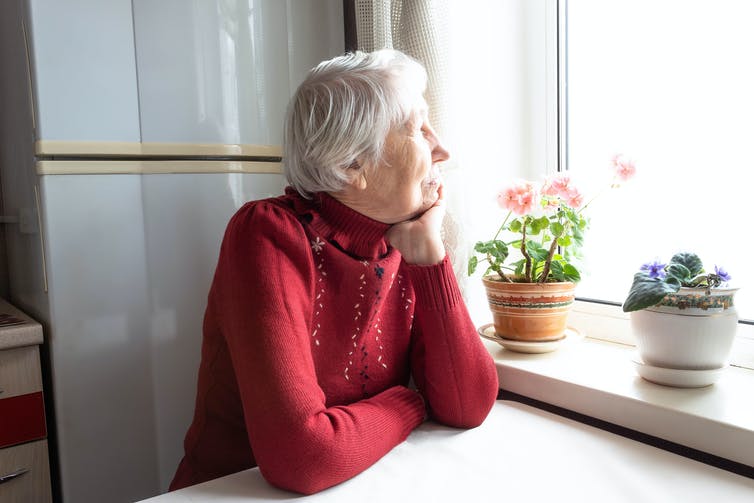
a35mmporhora/Shutterstock
Depression and anxiety disorders increased by over a quarter globally in 2020, according to a recent review of 48 scientific papers. But although there’s been an obvious negative trend during the pandemic, deteriorating mental health hasn’t been inevitable, and people haven’t been affected equally.
In our recent study, we found that there’s variation in how the pandemic has affected mental health, and that for some, mental wellbeing actually increased under COVID.
We surveyed a nationally representative sample of around 4,200 Danish people in the autumn of 2020. Importantly, these people had already taken part in a population survey in the autumn of 2019, so we could compare their responses half a year into the pandemic with how they reported feeling just before it started.
For most, their mental health declined. The average score participants gave their mental wellbeing fell from 25.5 to 24.6 (on a scale ranging from seven to 35). At the same time, the proportion of people reporting low levels of mental wellbeing (indicative of poor mental health) increased from 16.5% in 2019 to 20.1% in 2020. The decreases in mental wellbeing were similar across the sexes and age groups.
But surprisingly, we saw no decrease in mental wellbeing among people with longstanding physical or mental illnesses, nor people living with depression prior to the pandemic. In fact, for people who had depression beforehand, we saw an increase in average mental wellbeing, from 18.7 to 19.6.
What influenced these changes?
Various factors probably played a role in the general decline in the population’s mental wellbeing, such as economic hardship, heavy COVID-related media exposure, and reduced social connectedness driven by lockdowns, travel restrictions, school and workplace closures and so forth.
Our results confirmed that reduced social connectedness in particular could account for the decline. Participants’ sense of whether they “felt close to other people” showed a pronounced decline between 2019 and 2020.

Solarisys/Shutterstock
The link between feelings of connectedness and wellbeing isn’t surprising. In a previous study, we found that intensified loneliness during the pandemic was associated with a six- to ten-fold increase in depressed mood, anxiety symptoms and sleep problems.
It’s also worth noting that while there were minor restrictions in place at the time of our survey in autumn 2020, the most severe COVID control measures (full lockdown and so on) had passed. But we still recorded a negative impact on wellbeing, which suggests that the mental health of the general population doesn’t easily and immediately bounce back when restrictions are lifted.
Meanwhile, the average mental health of those who already had depression improved. This may seem counterintuitive, but there are several reasons why these people may have fared better. Prior crises have also been associated with improved social functioning in some people. This could be because the stress experienced can stimulate cooperative and trusting behaviour. And this could potentially benefit those with depression.
For example, some depressed people may have found an opportunity to pass on their own coping experiences to others and support them in dealing with difficult circumstances, which in turn could have benefited their own mental wellbeing. Unlike most others, they may also have been well equipped – because of their experience with depression and social withdrawal – to cope with the social isolation of lockdown.

Enrique Arnaiz Lafuente/Shutterstock
There’s also anecdotal evidence that people with depression fared better because they felt less judged or stigmatised as a result of the overall decline in mental health across the population. With people around them experiencing emotional distress in response to the pandemic, people with poor mental health may have felt less like a minority.
It’s also possible that the pandemic alleviated some social pressures and unwanted interactions with other people. At the same, more time spent with immediate family could have enhanced mental wellbeing.
That said, an important thing to note is that people with prior depression didn’t experience levels of mental wellbeing that were higher than everyone else’s, but simply an improvement relative to how they felt prior to the pandemic.
A contradiction of earlier results?
Some previous studies have suggested greater declines in overall mental wellbeing than our results suggest. And previous results have suggested that most who were depressed before the pandemic felt worse during it – which appears to contradict what we’ve reported in our study.
However, these past studies relied on participants’ ability to recall how they felt before the pandemic. They only collected data at one point in time, after the pandemic had started. This potentially leads to recall bias: people inaccurately estimating how they felt in the past. The fact that we were able to compare results taken from the same nationally representative sample before and during the pandemic allows us to draw much firmer conclusions by removing this bias.
These earlier studies also looked across multiple countries, whereas our study was strictly based on Danish data. People in other countries – with different health and social systems – may have been affected differently.
We still need to better understand how the pandemic resulted in declining mental wellbeing in the general population, and perhaps more importantly, how we can mitigate this under future pandemic conditions. There’s also an important opportunity for us to investigate what specifically during the pandemic brought about these positive effects for people living with depression, to see if we can improve their lives and recovery after COVID has subsided.
![]()
Lau Caspar Thygesen receives funding from research foundations including Trygfonden, the Danish Cancer Society and Velliv Foreningen.
Ola Ekholm and Ziggi Ivan Santini do not work for, consult, own shares in or receive funding from any company or organization that would benefit from this article, and have disclosed no relevant affiliations beyond their academic appointment.























